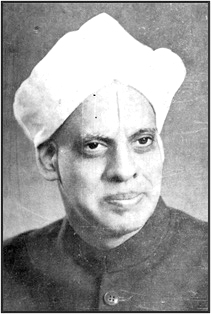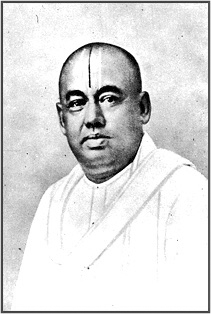Registered with the Registrar of Newspapers for India under R.N.I 53640/91
Vol. XXVII No. 18, January 1-15, 2018
Lost landmarks of Chennai
JAGANNATHA BHAKTHA SABHA
The Academy’s rival, firm, but helpful

R. Rangaramanuja Iyengar.
Today it is barely remembered, but in its time, the Jagannatha Bhaktha Sabha was an organisation to contend with in the world of fine arts. Writing about it in connection with its 15th anniversary celebrations in 1933 (which therefore indicates that the Sabha was founded in 1918), Dr. V. Raghavan said that it was comparable to the Music Academy in many respects. That, coming from a pillar of the latter organisation, was quite a compliment.
For all its high sounding name, the JBS was at heart a simple sabha. It operated from the verandah of Veda Vilas, the residence of Rao Bahadur T. Rangachariar, located on Egmore High Road. The prime mover was Rangachariar’s son, R. Venkatachari aka Muthanna, a powerful personality in the world of music notwithstanding certain physical disabilities. A close associate was the vitriolic music scholar, writer and veena player R. Rangaramanuja Iyengar. Muthanna was the founder and in his acidic memoirs titled Musings of a Musician, Rangaramanuja Iyengar writes of how the two met. Iyengar had taken up a job at the MCtM School in Purasawalkam and had just then moved from Mannargudi to Madras. He had come to attend a concert at the JBS when Muthanna, who had earlier met him at Mannargudi, welcomed him and declared that he was henceforth his partner in running the sabha.
All performances were held on the same verandah. Those were days when Egmore High Road had hardly any traffic and the garden of Veda Vilas was vast enough to ensure that external noises did not penetrate the verandah. The JBS took its roles and responsibilities very seriously. It “existed for helping struggling members of the music profession, for employing and encouraging all deserving musicians and Bhagavatars without any idea of saving for itself.” Simplicity and dedication to the arts was its ideal. That did not mean it diluted its standards in music. Making a name at the JBS was very difficult and careers took off if the JBS audience approved.

Muthanna.
Among those who made their debuts as performing artistes at the JBS were the sisters Brinda, Muktha and Abhiramasundari. The mridangam exponents Palghat Mani Iyer and Palani Subramania Pillai were introduced to Madras audiences here, as were the vocalist duo, the Alathoor Brothers. M. Balamuralikrishna came to Madras in 1941 at the invitation of JBS and his concert here was reviewed in glowing terms by critic Kalki Krishnamurthy. Two years later, mridangist Vellore Ramabhadran had his debut on the same verandah.
A regular in the audience was the chit fund magnate of George Town, Jalatarangam Ramaniah Chetty, and if the music pleased him the artistes were sure of being given a gold medal or two, on the spot. Other illustrious members included Dewan Bahadur K.S. Ramaswami Sastrigal, Sir C.P. Ramaswami Iyer, the publisher G.A. Natesan and the manager of Orient Longman’s – W. Doraiswami Iyengar.
Concerts at the JBS began and ended on time and no performance was ever held up for any reason. Thus it was that during a Harikatha concert of C. Banni Bai, one of the daughters of the house who was attending the performance, went into labour. She was immediately ushered in even as the Harikatha continued. A short while later someone came out to announce that it was a girl. The child was named Rajalakshmi and we know of her today as Mrs Y.G. Parthasarathy. Through all that drama the Harikatha had gone on, and ended on time.
The JBS, as was said earlier, believed in helping musicians who it felt were deserving of its kindness. The composer Papanasam Sivan was a major beneficiary. The first compilation of his songs was published by JBS and released in 1934. A purse was put together by the members and given to Sivan on the same occasion. The publicity-averse Veena Dhanam was coaxed to perform at the JBS on a couple of occasions. When S. Satyamurti felt it was time that the first non-Devadasi woman performer – C. Saraswati Bai – was honoured, he approached the Madras University Syndicate suggesting her portrait be unveiled. When no satisfactory answer was forthcoming, it was to the JBS he turned. The sabha rose to the occasion and organised a grand event in 1939. A souvenir compiling articles on the lady was brought out and the portrait was unveiled in the 1940s. The JBS associated itself with two other noble causes. Thanks largely to Rangaramanuja Iyengar, it helped Madras Lalithangi, the mother of M.L. Vasanthakumari, bring out a book of Purandara Dasa songs. It also helped Rangaramanuja Iyengar bring out his compilation of Tyagaraja songs titled Kritimanimalai, in time for the composer’s death centenary in 1947.
The JBS was a tad haughty too. Thus it was that it resented the Music Academy’s strong-arm tactics. When the latter organisation suggested a federation of city-based sabha-s, the JBS was more than willing. But when the Academy said that such a body ought to recognise it as the leader with all other sabha-s being subservient to it, the JBS withdrew at once, Muthanna firmly stating that in his eyes all organisations were equal, including the Academy! That ended the federation and it would take years to become reality, long after the demise of the JBS. The sabha also did not join the December Music Season rat race. It held its festival in August, to coincide with Janmashtami. Titled the Sri Jayanti series, it attracted the best performers in the field. Ariyakkudi, Chembai, Musiri, Semmangudi, M.S. Subbulakshmi… you name them and they had all sung for the JBS.
That such an organisation so wedded to the arts did not survive comes as something of a surprise. Or perhaps it is not so surprising after all – the Sabha after all did not believe in saving anything for itself. It was in a way quixotic. With Muthanna growing old and passing away, the JBS could not meet at Veda Vilas. It later shifted to a school in Egmore and held concerts there for a while. But with Rangaramanuja Iyengar too ageing and moving to Bombay to live with his daughter, JBS faded away. Today a few letterheads are all that survive of the Sabha. Veda Vilas is now a compound with several houses in it, all built by the descendants of T. Rangachariar.
Today a sabha functioning in an open-air location with no artificial amplification can only be imagined.

